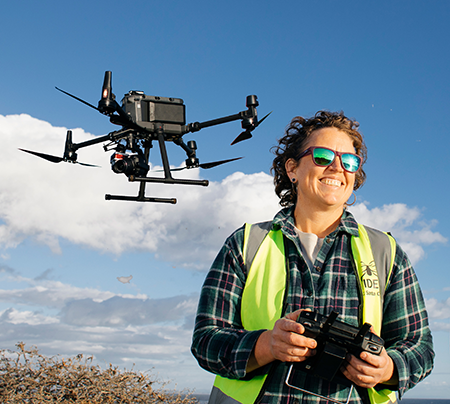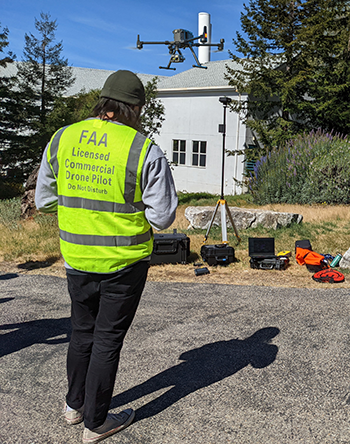Campus News
The sky’s the limit: Becca Fenwick gives research and education a new perspective with drone tech
The CITRIS principal investigator and director of the CITRIS Initiative for Drone Education and Research at UC Santa Cruz advances wildland management, ecology research and workforce development with uncrewed aerial vehicles and remote sensing systems

“The nature of CITRIS is that you can work with all campus departments on different types of issues — not just engineering, but also art, culture and policy,” said Becca Fenwick, a principal investigator (PI) at the Center for Information Technology Research in the Interest of Society and the Banatao Institute (CITRIS), and director and co-founder of the CITRIS Initiative for Drone Education and Research (CIDER) at the University of California, Santa Cruz. “People are learning new things about drones every day, so CITRIS with its interdisciplinary expertise is the perfect place to have CIDER.”
Established in 2021, CIDER brings together UC Santa Cruz students and faculty and industry partners to advance research that uses uncrewed aerial vehicles, aka UAVs or drones, and to train a drone-savvy workforce on California’s Central Coast.
Fenwick’s position at CIDER combines her hard-earned expertise in spatial data and sensor research with landscape conservation work she performed in various roles in the UC Natural Reserve System (NRS), the largest network of research reserves in the world, which includes 41 protected natural areas across California.
Fenwick was introduced to the NRS in a field ecology course while working on her Ph.D. in marine geology and geophysics at the Scripps Institution of Oceanography at UC San Diego, and she immediately fell in love.
“I thought, oh my goodness, what an amazing resource UC has,” she said.
She joined the NRS as director of the James San Jacinto Mountains Reserve at UC Riverside and leader of the systemwide IT committee in 2007. As the James Reserve’s director, she managed the facility’s operations and research activities, including its usage as a test bed for the Center for Embedded Network Sensing, a now-retired research enterprise funded by the National Science Foundation (NSF) and led by UCLA.
“The center took computer scientists and ecologists, put them in a box and shook them up, and then out came all these sensors and new ways of measuring stuff,” Fenwick said. “The reserve got to test it all because they needed an outdoor location that had Wi-Fi, to see what happened when you put instruments that worked perfectly in the lab out where there are spiders and wasps and weather.”
Over the next decade-plus, Fenwick held a number of facility, research and technology management positions with the NRS, including a stint at the Sierra Nevada Research Stations at UC Merced, where she worked closely with the National Park Service at Yosemite and Sequoia Kings Canyon. She served as the NRS’s first systemwide director of environmental information technology, where she helped to implement the UC NRS Climate Monitoring Network, a system of 35 automated weather stations with high-precision equipment in diverse landscapes across the state.
Fenwick was also instrumental in developing the California Heartbeat Initiative (CHI), which used drones, multispectral cameras and wireless sensor stations to survey and monitor freshwater in California ecosystems. As co-PI, program director and lead drone pilot of CHI, she managed a broad swathe of administrative functions, while also coordinating field campaigns, overseeing a team of four pilots, processing data and performing survey flights.
After wildfires burned thousands of acres across the NRS in August 2020, Fenwick and other CHI researchers flew drones over the scorched landscapes to help assess the damage and understand how the reserves were recovering. (In an example of CITRIS serendipity, a 2022 CITRIS Seed Funding project led by UC Davis and UC Berkeley PIs is using this post-blaze data to help predict the impact of future wildfires on California landscapes.)
“I spent three years doing this fieldwork and I got particularly excited about drone technology,” Fenwick said. “When the COVID-19 pandemic began, I worked with [CIDER co-founders] Michael Matkin and [Santa Cruz County Third District Supervisor] Justin Cummings to develop a drone initiative for CITRIS.
“Drone research was happening on every campus in the UC system, but there wasn’t a coordinated drone teaching program before CIDER.”
CIDER is the first formal drone education program at the University of California, offering pilot training, faculty mentorship and industry connections for undergraduate students at UC Santa Cruz. In CIDER’s 16-week curriculum, students receive hands-on instruction and the opportunity to fly and program drones, as well as a stipend and the chance to take the Federal Aviation Administration (FAA) Part 107 pilot certification exam without charge.
Students from groups that have been historically underrepresented in STEM fields, including women and people of color, are particularly encouraged to apply to the Pilot Training Program.
Once students receive their drone pilot’s license, they are eligible to work with CIDER’s industry partners. CIDER accepts contracts within the UC system and with external companies for research and surveying jobs that require drones, and the program employs students to provide them with practical work experience.
“We ask industry partners what they’re looking for in new employees in terms of skill sets and interests,” Fenwick said. “So we can make sure that our students have those skills and can get those jobs once they’ve graduated.”
Thanks to the efforts of Fenwick and the CIDER team, UC Santa Cruz is the first campus in the system to receive FAA Unmanned Aircraft Systems Collegiate Training Initiative (UAS-CTI) designation.
Since 2019, Fenwick has also served as an instructor and coordinator at DroneCamp, a weeklong annual short course that CIDER co-hosts alongside the UC Division of Agriculture and Natural Resources; the UC Center of Excellence on Unmanned Aircraft Systems Safety housed at UC Merced; California State University, Monterey Bay; and the Monterey Bay Drone, Automation and Robotics Technology (DART) Initiative.

Open to people of all skill levels, DroneCamp focuses on the research applications of drone technology. Attendees over the program’s seven-year history have included industry partners, community members, research faculty and students such as Jon Detka, a Ph.D. candidate in environmental studies at UC Santa Cruz.
As part of his doctoral research, Detka was studying patterns in tree and shrub canopy dieback due to drought at the Fort Ord Natural Reserve, but his data collection method — swinging around a 20-foot-long swimming pool sweep with a GoPro video camera attached — was proving to be ineffective and dangerous. While he knew about the potential of drone technology for fieldwork, he felt he had neither the experience nor the resources to use them in his project.
Enter Becca Fenwick, who at that point was performing frequent drone surveys for CHI.
“Given the reserve’s proximity to Marina Municipal Airport, I thought it would prove challenging to get authorized drone flight surveys,” said Detka. “Becca was instrumental in putting me in contact with the right people to make the surveys happen. She helped me identify resources, navigate permissions, and gain valuable flight training and data processing experience as part of the ongoing CHI surveys.”
Detka now works for CIDER as a senior drone pilot and advanced geographic information systems (GIS) technician, working with Fenwick to design CIDER’s curriculum while finishing his doctorate.
“I think what sets Becca apart as a leader is that she understands the value of mentoring as part of the learning and research training process. She meets students where they are,” Detka said.
Fenwick is working to expand CIDER’s footprint beyond the UC Santa Cruz campus. Last year, the initiative and several partner organizations received $1 million from the James Irvine Foundation to develop a workforce training program for the Salinas and Pajaro Valley regions. The new program will establish a pathway for incumbent workers as well as students, with an emphasis on serving communities that have been historically excluded from high-tech professions.
A similar project, also funded by the Irvine Foundation, has Fenwick collaborating with longtime partner Monterey Bay DART, a public benefit corporation with a mission to grow climate-smart, high-tech industry on the Central Coast. DART’s executive director, Josh Metz, commends Fenwick as a “strategic thinker, inspirational team leader and impactful doer.
“Becca shows up to each project with great enthusiasm for the subject, deep understanding of theoretical and technical issues, and a desire to see her work have real impacts on people’s lives for the better,” Metz said. “I feel honored to call her a colleague.”
With the support of a 2022 CITRIS Seed Award, Fenwick and co-PI Alice Agogino will turn their attention to aiding and educating emergency responders during wildfires. While Agogino leads the creation of a fleet of drone-deployed, sensor-equipped robots to collect data on fire-prone areas, Fenwick is developing a curriculum that teaches fire response professionals how to use those drones and process the information that their sensors return.
Fenwick will also co-direct a five-year, $10 million project, led by CITRIS PI Stacy Philpott and funded by the U.S. Department of Agriculture, to cultivate a diverse food and agriculture workforce. The program will support the educations of K-12 students, UC Santa Cruz undergraduate and graduate students, and local farmworkers.
“When you’re working with a student,” Fenwick said, “you can see that light bulb go on and you can almost hear them thinking of all the different ways they could use that technology. It’s really satisfying and fun.
“I’m super excited about the potential of drones, not just here at Santa Cruz but across the CITRIS campuses,” she said. “I can’t wait to see where we are in a year or two.”